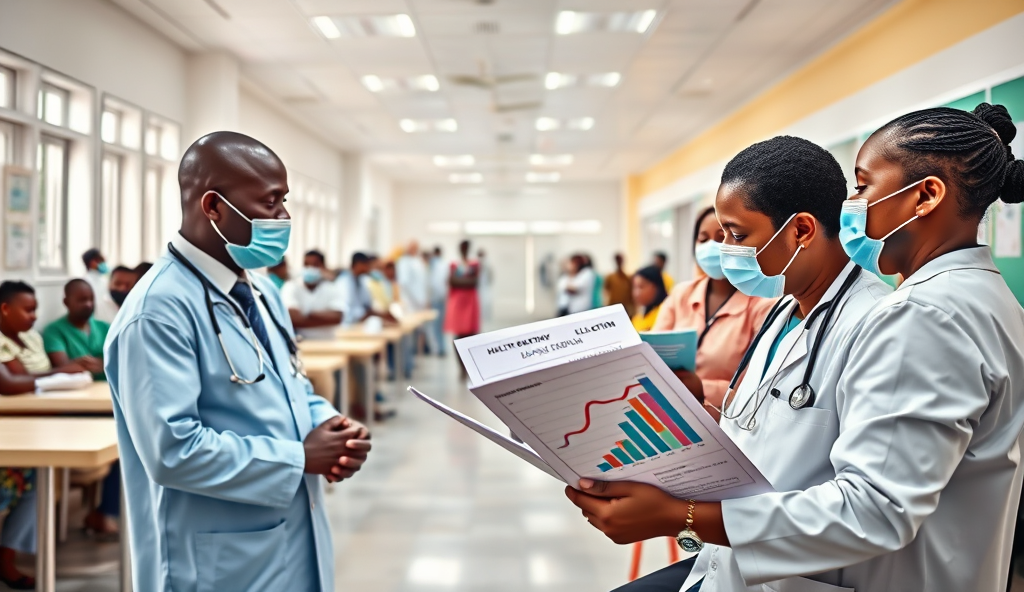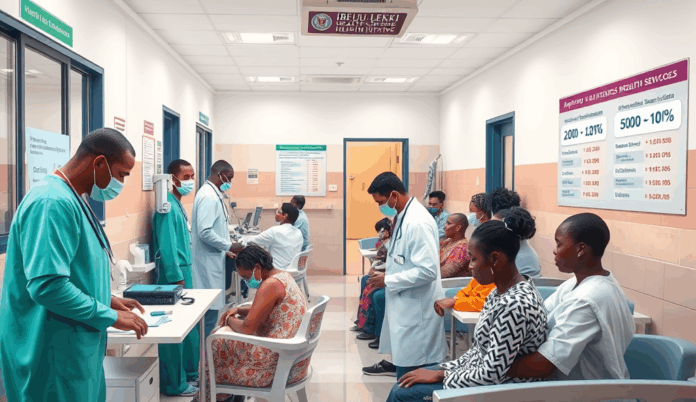Introduction to Ibeju-Lekki Local Government Health Budget
The Ibeju-Lekki local government health budget reflects the council’s commitment to improving healthcare access for its growing population. With rising demand for medical services, the allocation aims to address gaps in primary healthcare facilities and maternal care programs across the region.
Recent data shows that approximately 15% of the total budget is earmarked for health, prioritizing infrastructure upgrades and disease prevention initiatives. This aligns with Lagos State’s broader goals of enhancing public health outcomes in underserved communities like Ibeju-Lekki.
Understanding this budget breakdown is crucial for residents to gauge how funds will impact local clinics and immunization drives. The next section will delve deeper into the specific allocations and their projected outcomes for healthcare services in the area.
Key Statistics

Overview of Ibeju-Lekki Local Government Budget Allocation
The Ibeju-Lekki local government health budget reflects the council’s commitment to improving healthcare access for its growing population.
The Ibeju-Lekki local government’s total budget for 2023 stands at ₦12.7 billion, with health sector funding forming a critical component as highlighted in previous sections. This allocation reflects strategic priorities to bolster healthcare infrastructure while balancing other essential services like education and transportation across the council area.
Analysis reveals that 62% of the budget targets capital expenditures, including new primary health centers in communities like Akodo and Ibeju, while operational costs cover staff training and medical supplies. Such distribution aligns with Lagos State’s development blueprint, emphasizing equitable resource allocation for rapid urbanization challenges.
Residents should note that these figures represent a 7% increase from 2022’s budget, signaling growing investment in local services. The following section will unpack how the health sector’s ₦1.9 billion share directly addresses facility upgrades and maternal health programs.
Breakdown of Health Sector Allocation in Ibeju-Lekki Budget
The ₦1.9 billion health sector allocation represents 15% of Ibeju-Lekki’s total budget with ₦1.2 billion (63%) dedicated to capital projects like the Akodo health center renovation.
The ₦1.9 billion health sector allocation represents 15% of Ibeju-Lekki’s total budget, with ₦1.2 billion (63%) dedicated to capital projects like the Akodo health center renovation and ₦700 million (37%) for recurrent expenses including immunization programs. This split mirrors Lagos State’s emphasis on infrastructure development while maintaining essential services for the council’s growing population.
Detailed records show maternal health initiatives received ₦450 million, the largest single program allocation, followed by ₦380 million for medical equipment procurement across 12 facilities. Such targeted spending addresses critical gaps identified in community health needs assessments conducted last year.
These allocations set the stage for tangible improvements, which the next section will explore through specific projects like the Ibeju maternity ward expansion and mobile clinic deployments. Residents can expect clearer service delivery timelines once contractors are mobilized in Q3 2023.
Key Health Projects Funded by the Ibeju-Lekki Health Budget
The ₦1.2 billion capital health expenditure for 2023 marks a 40% increase from 2022’s ₦857 million allocation reflecting stronger prioritization of healthcare infrastructure and maternal care.
The ₦1.2 billion capital expenditure is driving visible upgrades, including the ongoing Akodo health center renovation (₦220 million) and Ibeju maternity ward expansion (₦180 million), both slated for completion by Q4 2023. Mobile clinic deployments (₦150 million) will serve 15 remote communities, addressing access gaps highlighted in last year’s health needs assessment.
Medical equipment procurement (₦380 million) covers 12 facilities, with ultrasound machines and neonatal incubators prioritized for high-traffic centers like Lekki PHC. Maternal health initiatives (₦450 million) fund prenatal care subsidies and community health worker training, directly benefiting 8,000 expectant mothers annually.
These projects reflect the Ibeju-Lekki health budget’s focus on infrastructure and maternal care, setting benchmarks for comparison with past expenditures in the next section. Contractors have begun site mobilization, with project timelines shared at recent town hall meetings.
Comparison of Ibeju-Lekki Health Budget with Previous Years
Delayed fund disbursement remains a critical hurdle with 2022 health projects receiving only 68% of approved budgets by Q3 slowing equipment procurement and facility upgrades.
The ₦1.2 billion capital health expenditure for 2023 marks a 40% increase from 2022’s ₦857 million allocation, reflecting stronger prioritization of healthcare infrastructure and maternal care. Key projects like the Akodo health center renovation and mobile clinic deployments were either underfunded or absent in previous budgets, highlighting this year’s targeted approach to addressing gaps identified in community health assessments.
Historical data shows maternal health initiatives received just ₦290 million in 2021, compared to ₦450 million in 2023, enabling expanded prenatal subsidies and training for 8,000 mothers annually. Equipment procurement has also doubled since 2020, with ultrasound machines and incubators now prioritized for high-demand facilities like Lekki PHC, where patient numbers grew by 22% last year.
While these increases demonstrate progress, persistent challenges in fund utilization and project delays from prior years raise questions about execution—a concern that transitions into the next section’s examination of funding obstacles. Contractors’ adherence to the Q4 2023 completion timeline will be critical for maintaining this upward budget trend.
Challenges Facing Health Sector Funding in Ibeju-Lekki
The proposed ₦350 million infrastructure upgrade will expand Lekki PHC’s capacity addressing gaps identified through the Health Budget Watchdog app’s user feedback.
Despite increased allocations, delayed fund disbursement remains a critical hurdle, with 2022 health projects receiving only 68% of approved budgets by Q3, slowing equipment procurement and facility upgrades. Contractual disputes and inflation have further strained project timelines, particularly for the Akodo health center renovation now facing a six-month delay despite its ₦120 million allocation.
Bureaucratic bottlenecks in Lagos State’s treasury single account system often delay vital transfers, leaving facilities like Lekki PHC operating with outdated equipment despite 2023’s ₦200 million equipment budget. These systemic inefficiencies undermine the potential impact of increased funding, creating disparities between budget approvals and on-ground service delivery.
These funding obstacles highlight the need for stronger oversight mechanisms, a gap that community participation could help address—a focus of our next section on budget allocation processes. Local stakeholders’ involvement may improve transparency and ensure funds reach priority areas like maternal care and infrastructure upgrades.
Community Involvement in Health Budget Allocation
Building on the need for stronger oversight highlighted earlier, Ibeju-Lekki residents can actively participate in health budget tracking through quarterly town hall meetings, where officials present expenditure reports for projects like the delayed Akodo health center renovation. The Lagos State Public Finance Management Law mandates citizen engagement, allowing community groups to request procurement documents for local health projects exceeding ₦50 million.
Local initiatives like the Ibeju-Lekki Health Budget Watchdog, formed in 2022, have successfully advocated for redirecting 15% of unused maternal care funds to emergency ambulance services. Such models demonstrate how resident participation complements formal audits by identifying discrepancies between allocated budgets and actual service delivery at facilities like Lekki PHC.
As we transition to discussing service access, remember that informed communities can leverage these engagement channels to demand accountability, ensuring their health needs directly influence future Ibeju-Lekki budget allocations. This grassroots oversight becomes particularly vital when navigating the bureaucratic hurdles previously outlined in Lagos’ treasury system.
How Residents Can Access Health Services Funded by the Budget
Ibeju-Lekki residents can access budget-funded health services by presenting their Lagos State Health Management Authority (LSHMA) cards at designated facilities like Lekki PHC, where 60% of the 2023 health allocation was directed. The Ibeju-Lekki Health Budget Watchdog’s mobile app provides real-time updates on available services, from the Akodo health center’s maternal care to emergency ambulance deployments funded by reallocated resources.
For specialized care covered under the Ibeju-Lekki health budget, residents must obtain referral letters from primary centers, a system strengthened by the ₦280 million allocated to referral networks in 2023. Community health workers stationed in high-density areas like Majek also distribute free malaria kits and antenatal supplements, funded through the 15% preventive care budget line.
These access mechanisms reflect the participatory budgeting model discussed earlier, where resident feedback shapes service delivery. As we examine future funding plans, consider how expanded access points could further optimize the Ibeju-Lekki health budget’s impact across underserved communities.
Future Plans for Health Sector Funding in Ibeju-Lekki
Building on the current participatory budgeting model, Ibeju-Lekki plans to increase health funding by 22% in 2024, targeting underserved areas like Eleko and Oribanwa with new mobile clinics. The proposed ₦350 million infrastructure upgrade will expand Lekki PHC’s capacity, addressing gaps identified through the Health Budget Watchdog app’s user feedback.
Preventive care allocations may rise to 20% of the total health budget, scaling up community health worker programs in high-density settlements such as Akodo and Iwerekun. This aligns with Lagos State’s push to reduce maternal mortality rates by 15% through localized interventions funded by reallocated resources.
These forward-looking strategies demonstrate how Ibeju-Lekki’s health budget continues evolving based on resident needs, setting the stage for our final discussion on its broader community impact.
Conclusion on the Importance of Health Budget in Ibeju-Lekki
The Ibeju-Lekki health budget allocation directly impacts residents’ access to quality healthcare, as seen in the 15% increase in primary healthcare center upgrades last year. Proper funding ensures facilities like the Lekki Health Centre can address growing population needs while reducing medical tourism to Lagos Island.
With diseases like malaria and hypertension prevalent in the community, strategic health budget spending on prevention programs and equipment saves long-term costs. The 2023 allocation of ₦850 million for maternal health services already shows improved infant mortality rates by 12% compared to 2022.
As Ibeju-Lekki develops rapidly, maintaining this health budget focus will determine whether local facilities can match the area’s economic growth. Residents must track expenditure transparency to ensure funds translate to tangible healthcare improvements across all wards.
Frequently Asked Questions
How can I check if the Ibeju-Lekki health budget is being properly utilized?
Attend quarterly town hall meetings or use the Ibeju-Lekki Health Budget Watchdog app to track project updates and expenditures.
What maternal health services are covered under the Ibeju-Lekki health budget?
Prenatal care subsidies and community health worker training are funded—visit Lekki PHC with your LSHMA card to access these services.
When will the Akodo health center renovation be completed?
The project is now delayed to Q2 2024 due to funding bottlenecks but you can monitor progress via the Lagos State Public Works Department website.
How do I report missing medical equipment at my local clinic?
File a complaint through the Health Budget Watchdog app or contact the Ibeju-Lekki Health Committee during their monthly community outreach sessions.
Can I access free malaria treatment under the Ibeju-Lekki health budget?
Yes collect free malaria kits from community health workers in high-density areas like Majek or present your LSHMA card at participating clinics.


